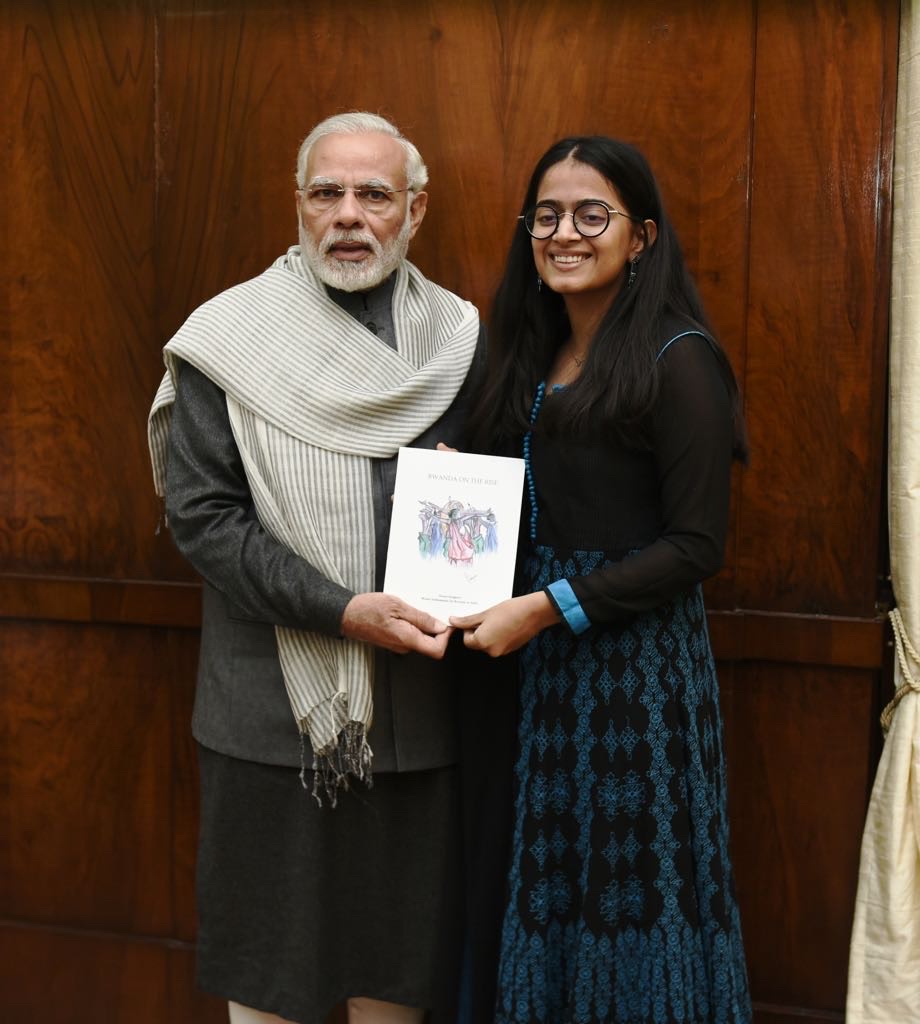Neysa Sanghavi: Singapore International School (2018), Special Advisor Govt. of Goa | B. Ambassador for Rwanda in India | Medical Student
Posted: 17 May 2023

Neysa Sanghavi graduated from Singapore International School (SIS) in Mumbai in 2018. While at school, she took advantage of the many opportunities to identify her passion and she found mentors who inspired her to action. Her story to date is characterised by a deep commitment to those who lack rights and resources, in particular refugees, and a determination to make a difference in the long term.
After SIS, Neysa attended the University of Southern California in Los Angeles where she studied pharmacology and drug development as well as human biology and entrepreneurship. She is currently studying medicine, and she is taking a slightly unorthodox approach. She is enrolled in the 4-year global medicine program at St George’s School of Medicine in Grenada. The program sees her completing her first year at Northumbria University in Newcastle upon Tyne in the UK. Next year she will be in Grenada, and that will be followed by two years of clinical rotation in the US. Neysa’s outlook is global, and she feels this program will best prepare her for her ambition to work in interventional cardiology. During our conversation, it soon becomes clear that Neysa’s interests and aspirations are diverse and dynamic, and she smiles as she says, “That’s my plan for now, but let’s see what happens!”
Neysa’s mother is a homeopathic doctor, and her father is an entrepreneur. Her sister is studying studio art at New York University and the family has always placed a value on education. Neysa joined SIS in grade 6 and quickly became immersed in the busy life of the school. In her final two years, she was appointed the Round Square prefect and she took a lead role in organising projects and conferences.
One project involved working with the Mumbai Municipal Corporation to improve the water quality in the Dahisar River. In the past, people would fish from its banks, but in recent years it had become an open sewer polluted by pesticides and cow dung. Neysa felt that the team needed to do some research before they could act effectively, so she arranged a trip to Sanjay Gandhi National Park to study the possibility of using the cow dung in biomass energy generation and then used those findings on the river project.
In 2017, Neysa and her colleagues organised and hosted a Round Square conference entitled “Expanding the Circle of Human Concern.” The focus was on exploring the concept of empathy in an international and multicultural context. Delegates pondered ways that different cultures could come together to solve global problems.
Neysa still remembers one Round Square Conference hosted by The Scindia School in Gwalior that taught her about making ethical choices. On the Service Day, they visited a village renowned for its snake charmers. However, the government had recently banned the practice. Neysa and her peers video recorded a visit to a woman whose husband had lost his job and whose family was now destitute. She was distraught and sobbing while telling her story. Some of the students thought that showing the woman’s distress to an audience would be unethical while others thought it was essential to establishing the reality of the situation. Neysa remembers it as an ethical dilemma to which there were two possible “right” answers, an ambiguity she has encountered many times since.
Neysa pays particular tribute to SIS Director, Mrs. Sharonee Mullick as a mentor who really encouraged her as she looked to articulate her desire to make a difference. “She was also the RS Rep at the school. She was inspiring and told me that I should expand my learning horizons beyond the school.”
Some years earlier, Neysa had travelled to Kenya. She visited Mombasa on the coast and the Masai Mara, and she fell in love with the country. She had heard stories about the tribal culture of Africa and about poverty and lawlessness, but her experience was so completely different that she wanted to explore and test these negative African stereotypes. She spoke with Mrs. Mullick about her ideas and decided to join a not-for-profit called Avega Agahozo, an organization created by widows of the Rwandan genocide to provide healing, mutual support, and socio-economic development to families devasted by the 1994 killing of one million ethnic Tutsi.
“I learned so much about what it meant to be a Rwandan and I was inspired by it. When I came back to school, I talked to Mrs. Mullick about ways to share my experience. It was amazing. I was able to go and give speeches in schools all over India. One of my speeches to a business group was picked up by the United Nations. The UNHCR contacted me and asked me to present at a massive event for World Refugee Day.”
So, in June 2017, Neysa found herself on a stage addressing an audience of 60,000 refugees about how, even as a 16-year-old, it is possible to have a voice. Her message was so powerful that the Rwandan government asked her to act as a brand ambassador for the country and she was presented with her credentials by Prime Minister Narendra Modi. She worked closely with the embassy in New Delhi to try to change the image of Rwanda to that of a country rich in culture with great potential for investment and tourism.
After graduation from SIS, Neysa continued her work with refugees.
“A lot of times refugees are stuck in camps for 60 or 70 years, perhaps their whole lives. They are purposeless, their lives lack meaning. They want to work but the rules don’t allow it. One project simply helped them to beautify the places they were housed. Just planting some flowers or painting a room with cheerful colours can make a big difference.”
Neysa also worked on a malaria reduction project. The refugee camp was located close to a swampy area, perfect for the breeding of the malaria carrying Anopheles mosquitoes. The female mosquitoes lay their eggs on the surface of pools of water and Neysa realized that human footprints in the soft, muddy soil were filling with rainwater and providing thousands of mosquito incubators. Neysa also encountered local beliefs that needed to be understood.
The UNHCR would provide house paint impregnated with insecticide, but local fatalistic beliefs in the will of God meant that most people wouldn’t use it. Donated mosquito nets were often repurposed as fishing nets which alleviated the more pressing need for food.
However, tenacity is one of the characteristics (and RS Discoveries) that Neysa developed at school.
“I like to observe, then analyze results and execute the work. I’ve come to believe that no project should be left half done.”
Her determination and commitment to Rwanda came to the attention of the President, Paul Kagame. She met him at a Youth Conference in 2019 and they discovered that his son had also attended USC.
“They knew all about my university. I met the First Lady and their daughter. It was so nice to make that personal connection.”
Neysa credits Singapore International School with helping her develop many traits of character.
“I think I always had a tiny bit of courage, but I didn’t know how to use it in the right way. I learned how to be diplomatic, courteous, and empathetic while I was trying to be courageous.”
Neysa says she was “really terrified” when she thought about going to Rwanda for the first time.
“I talked to Mrs. Mullick, and she pointed out that at the end of the day, it’s about what I would learn from them not the other way around.”
She also says that her schooling taught her empathy and determination. “Service is important, but it needs to be able to regenerate itself. It’s not like because you have turned up and contributed, the need has gone away. It’s not about ticking boxes on your list of accomplishments.”
It is often said that you have to earn respect but that’s not Neysa’s approach.
“I believe my first duty, my starting point, is to give respect. It is the first basis for a relationship.”
The commitment and skills that Neysa brings to everything she does continues to be recognised. Just recently, she was designated as the special advisor for the Ministry of Health, Women, Child Development, and Forest by the Government of Goa and has received felicitations from Indian Prime Minister, Narendra Modi for her work in Rwanda.
Neysa was clear about the advice she would give to other students at Round Square schools.
I would tell them to take every opportunity you get no matter how big or how small because you learn from everything. If you think you don’t have any opportunities, then I highly encourage you to make them.
Neysa concludes the call by sharing that she is going to spend the afternoon cooking for her roommate who hasn’t been well.
“I haven’t had time to look after her properly as I’ve been so busy, so I just want to cook her some soup and some good Indian food.”
Yet another thread in the fabric of a life being woven around service, and embellished with skill, determination, respect, and compassion.
